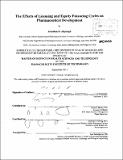The effects of licensing and equity financing cycles on pharmaceutical development
Author(s)
Alspaugh, Jonathan D. (Jonathan Douglas)
DownloadFull printable version (1.944Mb)
Other Contributors
Harvard University--MIT Division of Health Sciences and Technology.
Advisor
Fiona E. Murray and Jonathan J. Fleming.
Terms of use
Metadata
Show full item recordAbstract
The purpose of this paper is to examine the interactions between licensing status, equity issuance cycles, and drug development success at the small pharmaceutical companies that originate these development projects. Specifically, this paper is aimed at identifying how financing alternatives available to small pharmaceutical companies influence development success and firm behavior. The hypotheses developed and tested in this paper are as follows: H 1: Pharmaceutical development projects that are licensed are more likely to advance to the next stage in the clinical development process. H2: A licensed pharmaceutical development projects' likelihood of advancing to the next stage of the clinical development process will depend on the amount of equity issuance during the period in which the project was licensed. H3: Pharmaceutical development projects that are licensed during periods of low equity issuance are more likely to advance to the next stage in the clinical development process than projects that were not licensed or were licensed but not in a low equity issuance period. H4: Pharmaceutical development projects that originate at firms that have multiple projects in development at the beginning of a particular clinical trial stage are less likely to advance from phase I to phase II, but more likely to advance in later stages. H5: Pharmaceutical development projects that originate at firms that have previously launched a project in the market are more likely to be launched in the market. The results of a logistic regression analysis suggest that drugs licensed in periods of lowest equity issuance exhibit a higher rate of advancement from phase II to phase III. The relationship between advancement and amount of equity issuance at the time of licensing suggests that the lower the equity issuance in the licensing period the more likely the drug will advance. These results point to the possible existence of a "lemons" phenomenon in the market for pharmaceutical development projects. However, a different interpretation of the results suggests that large pharmaceutical company licensees are superior evaluators of quality and are perhaps more selective and opportunistically license higher quality drugs when equity issuance is low and licensors have no other financing options. Both interpretations point to the issue of information asymmetry as a central theme to this work.
Description
Thesis (S.M.)--Harvard-MIT Division of Health Sciences and Technology, 2011. Cataloged from PDF version of thesis. Includes bibliographical references (p. 30).
Date issued
2011Department
Harvard University--MIT Division of Health Sciences and TechnologyPublisher
Massachusetts Institute of Technology
Keywords
Harvard University--MIT Division of Health Sciences and Technology.